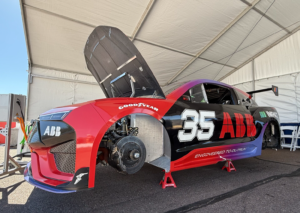This summer the star of the Kick-Ass films and Agent Carter is taking the action directly to fans. In the virtual reality short film from The Rogue Initiative director Ilya Rozhkov, actress Lyndsy Fonseca plays Alex Emerson, the wife of a secret agent who’s been kidnapped and is under mind control. The twist is that the entire 12-minute experience has been filmed from a first-person perspective that puts the viewer in the role of the protagonist and requires Fonseca to be on-camera the entire time as their sidekick.
Designed exclusively for VR, Agent Emerson serves as the pilot for the original content VR series, Identity Experience. In addition to more VR shorts (which will get longer in length), there are also plans for a traditional television series and video games. But 360-degree VR will be the entry point for the franchise, and the creators are banking on the continued excitement around mobile, console and PC VR to get things started. Fonseca weighs in on the challenges of working with new technology in this exclusive interview.
Innovation & Tech Today: What did you think when you first put on the VR headset?
Lyndsy Fonseca: They gave me one to use with your cell phone, but it’s not nearly as amazing as the Vive and Oculus set-ups they had at The Rogue Initiative. It was amazing to go through the whole variety of different types of VR experiences there.
I&T Today: What was it like bringing Alex Emerson to life in this VR short?
LF: It was a really a technical role. I’ve done plenty of action in films and television before, including doing stunt work, so that was something I knew going into it. But what was different about this was the technical aspect, so as an actress I really looked at it as a challenge to work with this technology.
I&T Today: What did having to do long, continuous takes add to the heavy action quotient of the shoot in Louisiana and Los Angeles?
LF: Yeah, there’s no editing. The long continuous take gives that aspect of live theatre, but it also introduces challenges for action because you can’t sell a punch to the camera or do re-blocking.
I&T Today: Galaxy Vision created a proprietary stereoscopic VR camera rig custom-engineered for this project called the “IC-Cam” (Identity Capture Camera). What was it like acting opposite a guy wearing this rig in front of his face?
LF: Yeah, I talk down the barrel of the IC-Cam, and I don’t even know how many camera lenses there were that circled his entire head like a crown helmet. I couldn’t see his face at all. Luckily, he was the same man who read the lines with me so that I’d have the timing, but he wasn’t performing. He’s literally worrying about balancing these lenses on his head and doing the fight choreography with me, so it really was like acting by myself.
I&T Today: What was the most challenging element of shooting the action?
LF: Everything was so different. There is a fight sequence, so that was definitely more challenging than anything I’d done before. My character needed to be moving all the time. And in VR when you’re doing fight choreography that was definitely a new challenge.
Some of the earlier 360-degree short films had the camera at the center of the room and actors would move around it. What we did had the camera involved as the main character, so it was really interesting and definitely cool. I hope people feel a whole new experience when they go through it.
I&T Today: Agent Emerson is part of a bigger universe. Where do you hope your character fits into the picture?
LF: I approached this as a one-and-done thing, so if they decide to expand this that would be great. I feel like even with Agent Emerson we’ve only scratched the surface of this character and this relationship.
I&T Today: How do you see this technology impacting the entertainment industry?
LF: It’s great to be part of the entertainment side of it and working as an actress in this medium. It’s so cool that in VR you can look wherever you want to look, and pick out details when you go back and watch it again.
You have the control of what you want to see, and that’s why VR will never take place of cinema because as a director you’re telling the audience where to look and how to look and how to feel when they’re looking at something. VR is a very different experience and I’m excited for the future.
I&T Today: What excites you about this new medium of virtual reality?
LF: I look at it also as not just a way of entertaining people. You can take this technology and help students in school experience and learn about history and be immersed in education in new ways. VR can be used to help patients with physical therapy.
By John Gaudiosi
Photos courtesy of The Rogue Initiative.









